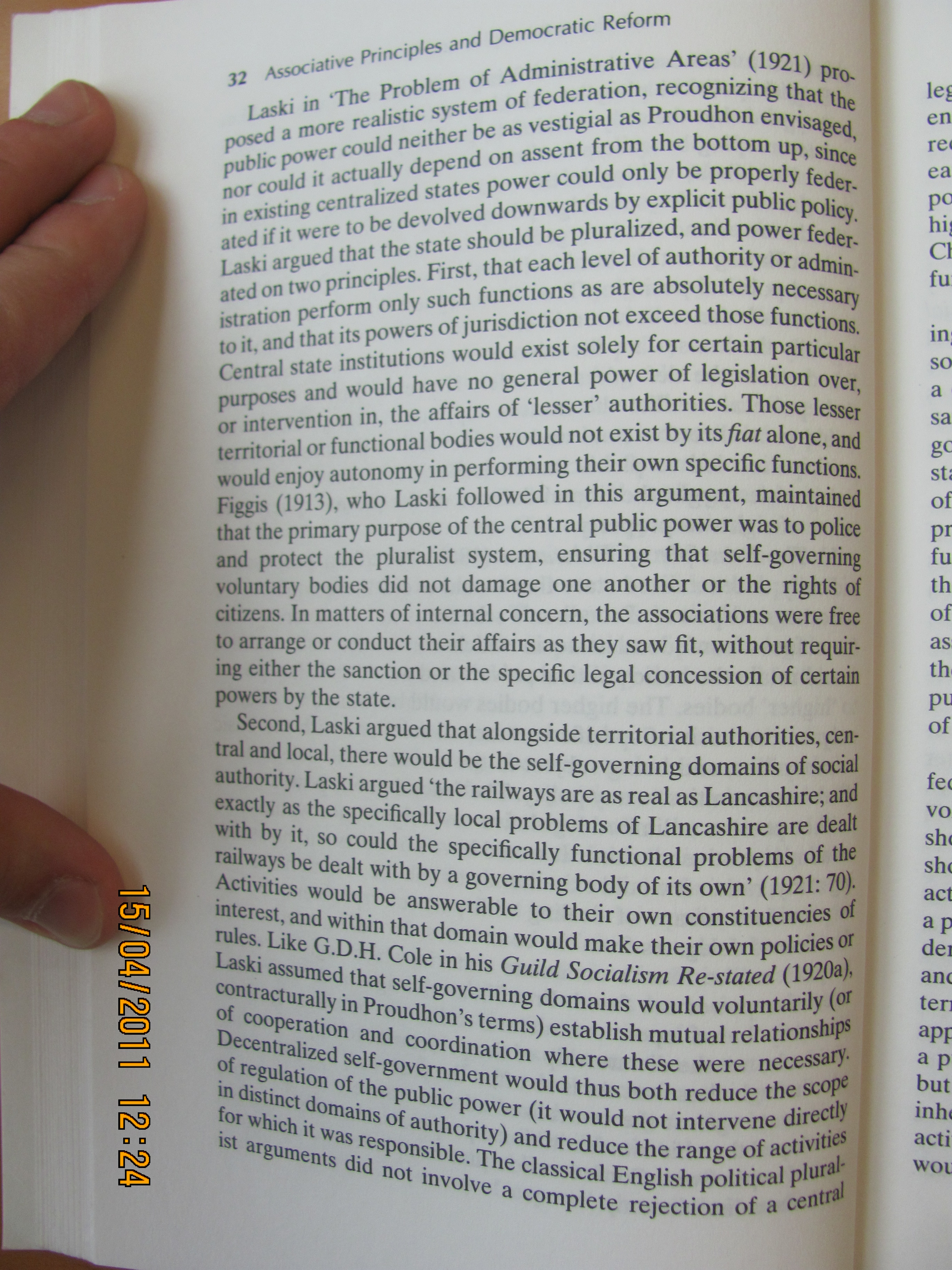IMG#20

32 Associative Principles and Democratic Reform
Laski in ‘The Problem of Administrative Areas’ (1921) pro. posed a morę realistic system of federation, recognizing that the public power couid neither be as vestigial as Proudhon envisaged nor couid it actually depend on assent from the bottom up, sińce in existing centralized States power couid only be properly feder-ated if it were to be devolved downwards by explicit public policy, Laski argued that the State should be pluralized, and power feder-ated on two principles. First, that each level of authority or admin-istration peiform only such functions as are absolutely necessary to it, and that its powers of jurisdiction not exceed those functions. Central State institutions would exist solely for certain particular purposes and would have no generał power of legislation over, or intervention in, the affairs of iesser’ authorities. Those lesser terri torial or functional bodies would not exist by its fiat alone, and would enjoy autonomy in performing their own specific functions. Figgis (1913), who Laski followed in this argument, maintained that the primary purpose of the central public power was to police and protect the pluralist system, ensuring that self-goveming yoluntary bodies did not damage one another or the rights of citizens. In matters of intemal concem, the associations were free to arrange or conduct their affairs as they saw fit, without requir-ing either the sanction or the specific legał concession of certain powers by the State.
Second, Laski argued that alongside territorial authorities, central and local, there would be the self-governing domains of social authority. Laski argued ‘the railways are as real as Lancashire; and exactly as the specifically local problems of Lancashire are dealt with by it, so couid the specifically functional problems of the railways be dealt with by a goveming body of its own’ (1921:70). Activities would be answerable to their own constituencies of I interest, and within that domain would make their own policies or rules. Like G.D.H. Cole in his Guild Socialism Re-stated (1920a), | Laski assumed that self-goveming domains would voluntarily (°r contracturally in Proudhon’s terms) establish mutual relationship8 of cooperation and coordination where these were necessary* I Decentralized self-govemment would thus both reduce the scops § of regulation of the public power (it would not intervene direcpl 1 in distinct domains of authority) and reduce the rangę of activitr^ i for which it was responsible. The classical English political plu*®? I ist arguments did not involve a complete rejection of a centr»* I
lei
en]
rej
ea
pq
hij
q
fu
inl sol a I sal
gc
stl
of
m
ful
thl
of
asl
thl
pj
of
fe<
vo
sh<
sh<
act
ap
dei
an<
ten
apf
ap
but
inh<
acti
woi
Wyszukiwarka
Podobne podstrony:
IMG#10 22 Associative Principles and Democratic Reform public power and of the devolved associationa
IMG#18 30 Associative Principles and Democratic Reform gain the upper hand and impose their view on
IMG#14 26 Associative Principles and Democratic Reform democratic naturę of the ‘primary association
88880 IMG#28 40 Associative Principles and Democratic Reform democracy as communication have the adv
82043 IMG#22 34 Associaftve Principles and Democratic Reform contradśction with centralized, bureauc
83038 IMG#16 28 Associative Principles and Democratic Reform a pleni tude of power and the right to
IMG#16 28 Associative Principles and Democratic Reform a pleni tude of power and the right to exerci
więcej podobnych podstron